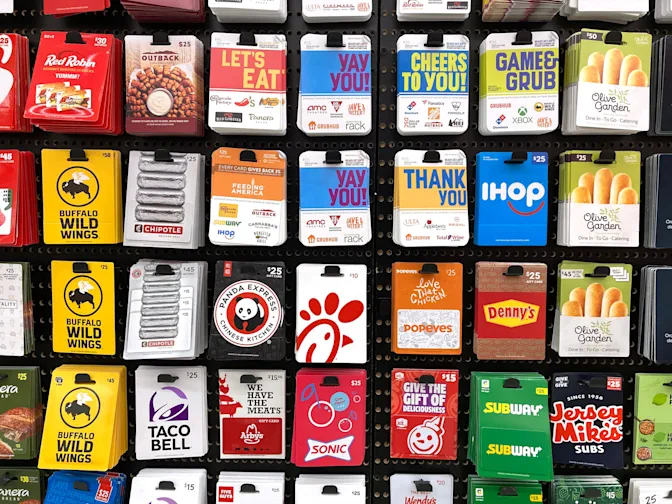
How to Avoid Common Holiday Phishing Scams This Thanksgiving
The holiday season is supposed to be filled with good food, great company, and gift-giving joy. But it's also prime time for scammers to come out of the woodwork, luring unsuspecting shoppers with fake emails, fraudulent texts, and too-good-to-be-true deals. In the spirit of staying safe this Thanksgiving — and well beyond — it's important to recognize the most common holiday phishing scams so you can steer clear of the digital grinches trying to ruin your season. Here are some of the most popular phishing scams to watch out for this year — and, more importantly, how to avoid them.
1. Fake Order Confirmation Emails
Nothing strikes panic into an online shopper's heart like receiving a "Thank you for your order" email ... for an order you didn't place. Scammers take advantage of this fear by sending fake confirmation emails from what appear to be reputable retailers like Amazon® or Walmart®.
How it works: These phishing emails contain links disguised as order tracking information or buttons to "cancel" the order. Clicking on these links redirects you to a malicious site designed to steal your login credentials or financial details.
How to avoid it: If you receive a suspicious confirmation email, don't click any links. Instead, log into your account directly on the retailer's website to verify your orders. If the email is fake, you'll know right away — and your personal data stays safe.
2. Too-Good-To-Be-True Deals

If an ad promises AirPods® for $29 or the latest gaming console at 80% off, your scam senses should tingle. Fraudsters know that holiday shoppers love a great deal, and they use fake promotions to lure you into phishing traps.
How it works: These fake promotions often arrive via email, text message, or pop-up ads, tempting you to click on them and "act fast." But instead of amazing discounts, the links direct you to malicious websites designed to steal personal and financial information.
How to avoid it: Stick to shopping only on trusted websites and verify deals through the retailer's official site. If the discount seems too good to be true, it probably is.
3. Charity Scams
The season of giving can make us more vulnerable to charity scams. Fraudsters create fake charities or impersonate legitimate ones, hoping to take advantage of your generosity during the holidays.
How it works: Scammers send emails, texts, or social media messages asking for donations, often urging you to act quickly to support a noble cause. Some even spoof the names of well-known charities to seem legitimate.
How to avoid it: Before donating, research the charity using trusted sites like Charity Navigator. Never give out personal or financial information over email or text, and make donations directly through the charity's official website or in person. Also, be cautious of high-pressure tactics and requests for cash or wire transfers.
4. Gift Card Scams

Gift cards are a convenient go-to holiday gift, but they're also a favorite target for scammers. These fraudsters trick you into purchasing gift cards and sending them the codes, claiming it's for payment or a prize redemption.
How it works: Scammers may pose as a friend, employer, or retailer, asking you to buy gift cards and share the numbers and PINs. Once they have the code, they’ve drained the balance — and you're left with an empty card.
How to avoid it: Remember, no legitimate company or organization will ask for gift card payments. If you get such a request, ignore it — and let the recipient know they may have been hacked.
5. Shipping Notification Scams
Since millions of packages are delivered during the holiday season, shipping scams have become increasingly common. Fraudsters send fake texts or emails claiming your package is delayed or needs additional information.
How it works: These messages often contain links to phishing websites that ask for personal details or charge fake "redelivery fees." Some may even install malware on your device when you click on the link.
How to avoid it: Always track your packages directly from the shipping company's official website or app. Be wary of any unexpected texts or emails regarding deliveries, especially those with spelling errors or sketchy links. Delivery companies such as FedEx and UPS will never ask you for your SSN or credit card number to "find" your delivery.
6. Holiday E-Card Scams

Digital greeting cards are a fun way to spread holiday cheer, but some of them carry more than good vibes. Scammers use infected e-cards to install malware or steal information.
How it works: A phishing email arrives with a link to view a holiday card from someone you "know." When you open it, malware is installed on your computer or phone, giving hackers access to your personal information.
How to avoid it: Only open e-cards from people you trust, and avoid clicking on links from unknown senders. Look for typos or suspicious URLs; they're often a sign the card isn't coming from Grandma after all.
7. Social Media Giveaways and Contests
We all love winning free stuff, but many giveaways floating around during the holidays are fake traps designed to steal personal information.
How it works: Scammers post fake contests or giveaways on social media, asking you to provide personal details to enter. Sometimes they'll ask for a small "processing fee" to claim your prize, only to take your money and disappear.
How to avoid it: Before entering any contest, verify it's hosted by a legitimate company through their official website or social media account. Never provide sensitive information for a giveaway, and avoid paying upfront fees. You can also adjust your privacy settings to control who sees your information.
Shop Smart, Stay Safe This Holiday Season
Thanksgiving kicks off a season full of celebrations — and online scams. But with a little preparation, you can outsmart the scammers and keep your holiday shopping stress-free. Stick to trusted websites, avoid clicking suspicious links, and double-check deals before making any purchases.
By staying vigilant, you'll enjoy a holiday season filled with joy, great deals, and fewer worries. Happy shopping — and stay safe out there!
References: How To Avoid The 15 Most Common Holiday Scams (2023 Update) | Top 10 Holiday Scams and How to Stay Safe























